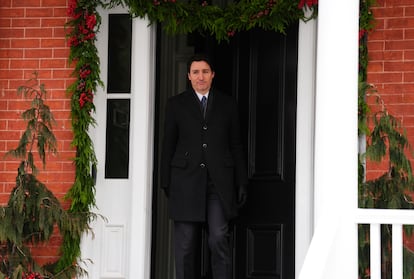Loss of popularity and internal battles: Tracking the downfall of Justin Trudeau
The Canadian prime minister’s announcement that he will resign when the Liberals elect a new leader opens up a scenario full of unknowns as the opposition pushes for early elections


When Justin Trudeau took over the Liberal Party of Canada in April 2013, it generated widespread relief among members of his group after years of internal squabbling and electoral defeats. In October 2015, the Liberals defeated the Conservatives, who had been in power since 2006, to thunderous applause and desires to make major changes thanks to the majority government that Canadians gave Trudeau at the polls. Fast-forward to this past Monday, when Trudeau announced that he would step down as prime minister as soon as the Liberals elect a new leader. He has had no other option. Besides the normal wear and tear after almost a decade in power, the Canadian premier has thrown in the towel due to a chain of circumstances largely caused by his way of exercising power.
“This country deserves a real choice in the next election, and it has become clear to me that if I am having to fight internal battles, I cannot be the best option in that election,” Trudeau said, showing no self-criticism but warning that the Conservative Party is a bleak option for Canada.
The resignation on December 16 of Chrystia Freeland, his deputy prime minister and finance minister, due to differences with the head of the executive was the high point of a crisis that had already been extending for too long in the halls of power in Ottawa. Trudeau never recovered the level of sympathy he enjoyed at the beginning of his first term. Despite this, he managed to win two more elections, although he was forced to form minority governments and featured prominently in several scandals bearing the same hallmark: ties with members of the highest economic spheres that sowed suspicions about a lack of ethics. The most notorious was his alleged desire to interfere in an investigation related to a construction company.
A combative conservative leader
Following the last election in September 2021, in the midst of the Covid pandemic, the Conservatives began to steadily rise in the polls, especially following the arrival of Pierre Poilièvre as party leader in 2022. Poilièvre has been able to channel the disenchantment with Trudeau’s Liberals with a combative style. Despite polls showing a decline in his popularity and an increase in preferences for the Conservatives, Trudeau repeatedly insisted that he would fight for re-election.
Canada has had to deal with a number of economic problems during Trudeau’s third term. High inflation was compounded by growing difficulties for large sections of the population to access housing, and rising unemployment. These last two factors were largely associated with the immigration policies carried out by the Liberal government to boost the economy after the Covid pandemic. The prime minister announced a reduction in quotas for new arrivals, as well as other initiatives to try to revive sympathies for his government. However, polls showed little change.
In September, the social-democratic New Democratic Party announced that it was breaking the agreement it had signed with the Liberals to allow Trudeau to govern in a minority without trouble. A month later, around twenty MPs from his own party asked the prime minister in a letter to give up his intentions to run in the next election. However, their leader played down this discontent, confirming that he would seek a fourth term.
In this already complicated environment, Freeland’s resignation was a bombshell for the Canadian prime minister’s plans. Trudeau has had a long list of disagreements with members of his team. It is no secret that he has always had difficulty listening to dissenting opinions or tolerating any hint of disloyalty. Jody Wilson Raybould, Jane Philpott and David Lametti are some of the ministers who have left through the back door. However, Freeland did not tolerate the same treatment.
The Liberal leader had been instructed to announce a budget update with a significant new deficit. Trudeau's Liberals thus reneged on their promise of stricter management of public accounts after the end of the pandemic. Trump's return to the White House also increased the level of concern in Canada about the need for strong leadership in Ottawa.
On the same day Freeland resigned, several Liberal MPs asked Trudeau in a closed-door meeting to step aside, for the good of the party and the country. The leader responded that he would take some time to reflect. As the days passed, dozens of Liberal MPs publicly declared themselves in favor of his departure. According to Canadian media, the prime minister held private meetings with various members of his party, meetings where he was accompanied by his closest circle of collaborators, but the die was already cast.
On Monday, when he announced that he would step down as party leader but will remain as prime minister until a new leader is appointed, Trudeau also said that he had asked the Governor General of Canada, Mary Simon, to suspend parliamentary proceedings. The legislative body will resume its work on March 24. This decision, designed to give the Liberals time to reorganize, prevents a no-confidence vote that would topple the government before that date. It also means that all bills that have not been approved will be discarded. The most publicized case is the Liberal project to increase the capital gains tax on the richest Canadians.
Opposition parties have reacted vehemently to Trudeau’s decision to pause parliamentary work, as their demand was to call early elections. “Everything is out of control, and now the government is out of control. This cannot continue like this,” said Poilièvre.
The goal of October
Federal elections were scheduled for next October, a scenario that is unlikely to happen because opposition forces say they will topple the government at the first opportunity. The resumption of parliamentary work at the end of March will open up such a possibility. The Liberals are expected to fail in the first vote of no confidence or to ask the Governor-General to dissolve parliament. Various analysts predict that the elections will be held in May, since electoral laws stipulate that the campaign must last at least 36 days.
The election of a new Liberal leader is causing a headache for the various levels of the party. To begin with, selecting a new leader is a process that usually takes at least four months, but circumstances leave no other option than to do so in a few weeks. And so far, none of the most talked-about candidates have publicly indicated their intentions. Freeland and Mark Carney, former governor of the Bank of Canada, are considered the favorites in the race. Other names circulating are Anita Anand (Minister of Transportation), Mélanie Joly (head of the Foreign Affairs portfolio), Dominic LeBlanc (Minister of Finance) and François-Philippe Champagne (in charge of the Ministry of Science and Industry).
The task for the new party leader is fraught with challenges. According to a Research Co. poll released Sunday, the Conservatives enjoy a 26-point lead over the Liberals. Given the almost inevitable scenario of early elections, it will be extremely difficult to build a candidacy with serious intentions of winning that will erase Trudeau's image from his group after almost a decade in power.
Another possibility is to try to take as many votes away from the Conservatives as possible so that they can only form a minority government, although this will also depend on the performance of the New Democratic Party and the Bloc Québecois. Michael Ignatieff, one of Canada’s most prestigious intellectuals and leader of the Liberals between 2009 and 2011, wrote a message on X after Trudeau’s announcement on Monday. “It should not have ended this way, but Spring will come, the grass will grow and the Liberal Party will rise again,” Ignatieff posted, although this resurgence may not be a matter of months, but years.
Sign up for our weekly newsletter to get more English-language news coverage from EL PAÍS USA Edition
Tu suscripción se está usando en otro dispositivo
¿Quieres añadir otro usuario a tu suscripción?
Si continúas leyendo en este dispositivo, no se podrá leer en el otro.
FlechaTu suscripción se está usando en otro dispositivo y solo puedes acceder a EL PAÍS desde un dispositivo a la vez.
Si quieres compartir tu cuenta, cambia tu suscripción a la modalidad Premium, así podrás añadir otro usuario. Cada uno accederá con su propia cuenta de email, lo que os permitirá personalizar vuestra experiencia en EL PAÍS.
¿Tienes una suscripción de empresa? Accede aquí para contratar más cuentas.
En el caso de no saber quién está usando tu cuenta, te recomendamos cambiar tu contraseña aquí.
Si decides continuar compartiendo tu cuenta, este mensaje se mostrará en tu dispositivo y en el de la otra persona que está usando tu cuenta de forma indefinida, afectando a tu experiencia de lectura. Puedes consultar aquí los términos y condiciones de la suscripción digital.








































